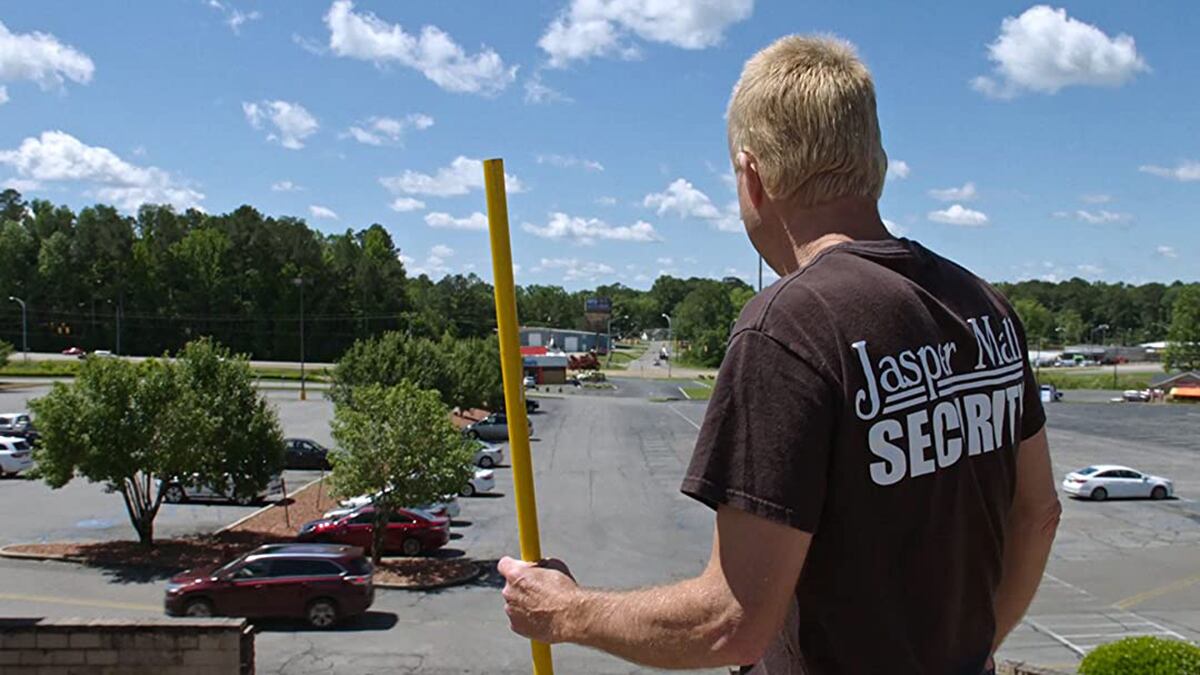Jasper Mall
***1/2 Demonized by generations of filmmakers as the physical manifestation of predatory commercialism and fad-chasing consumerist vapidity, the American mall, with its newfound obsolescence, calls for a more complicated analysis. Should we cheer the extinction of a Main Street-devouring invasive species or mourn the loss of any communal hub? Jasper Mall's elegiac portrait of its titular shopping center's steep decline evades easy answers. By withholding any historical details or regional context, we're forced to walk the small-town Alabama mall alongside the unhurried pace of locals getting their exercise inside the vaguely alien architecture of its long corridors. No matter how artful their shot compositions, documentarians Bradford Thomason and Brett Whitcomb (Lost Weekend; County Fair, Texas) hardly shy away from moments worthy of trending reality TV, but they never lean into the easy joke or sacrifice empathy for spectacle. Our de facto tour guide Mike, the mall's security guard, facility manager and maintenance man, only reveals his Joe Exotic-esque backstory as a former private zookeeper in Australia at the film's midpoint. When the Jewelry Doctor plugs in his electric guitar to drum up business for his struggling retail sales and repair shop, the riffs echoing through the empty concourse feel more joyous than desperate. It's a scene that highlights Jasper Mall's ability to showcase all that is valiantly ridiculous about the fight to keep the shopping center open in a tone that is both warm and dignified. NR. JAY HORTON. Amazon Prime, Google Play, Pluto TV, Vudu, YouTube.
https://www.youtube.com/watch?v=9V7ytbs3y5U
You Will Die at Twenty
*** The first image of You Will Die at Twenty is that of a dead, decomposing camel, splayed in the Sudanese desert. Its carcass serves as a ghastly portent of our protagonist Muzamil's assumed fate: As a baby, the village shaman prophesied that he would die at the tender age of 20. Now, Muzamil is 19 and the threat of imminent death looms over his head like a fog, affecting his behavior, life choices and relationships. The only person who doesn't treat him like a pariah is an eccentric old man on the outskirts of the village, and through him, Muzamil learns that oppressive religion and fate are both escapable. Shot on location in the village where director Amjad Abu Alala's parents are from, this existential coming-of-age drama is the first Sudanese film ever submitted to the Academy Awards for Best International Feature—it's also only the eighth Sudanese film ever made, as the country hasn't had a cinema industry since Omar al-Bashir's military coup in 1989. Considering these parameters, and the fact that the Sudanese Revolution began during filming (the picture is dedicated to the movement's victims), Alala's groundbreaking feature-length debut is even more impressive. NR. MIA VICINO. Virtual Cinema.
https://www.youtube.com/watch?v=FwvqmVWZE7I
My Little Sister
** Lisa (Nina Hoss) is a playwright struggling with writer's block. She hasn't been able to write since her twin brother and muse Sven (Lars Eidinger) was diagnosed with an aggressive form of leukemia—he lives in Berlin as an acclaimed theater actor, while she has reluctantly moved to Switzerland at the behest of her husband Martin's career. With Sven's condition worsening and Martin's job offering him a five-year contract, Lisa finds herself torn between living with her family in one country and caring for her brother in another. Stéphanie Chuat and Véronique Reymond's German-language cancer drama is Switzerland's official Oscar submission for Best International Feature. Though the formidable actors give compelling performances that elevate the thin script, the biggest problem is that Lisa is so relentlessly stubborn to the point that it's difficult to have much sympathy for her. Hoss is excellent as always in the role, but it's unclear why she can occasionally be so caustically cruel: In one scene, she berates her director friend for rightly refusing to let the weakened Sven exhaust himself to death by playing Hamlet onstage. Despite some genuinely tear-jerking moments, My Little Sister ultimately boils down to a navel-gazing, surface-level study of an insufferable privileged family. NR. MIA VICINO. Virtual Cinema.
https://www.youtube.com/watch?v=UG-qmUZoWmg
